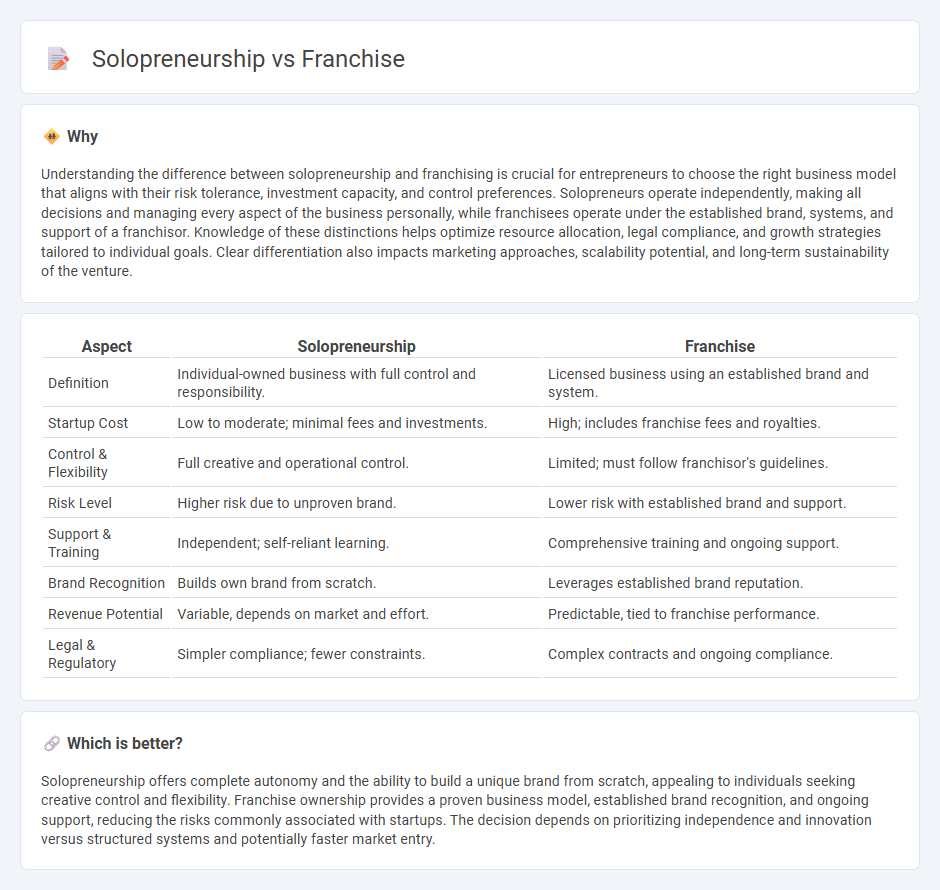
Solopreneurship involves individuals operating their own business independently, controlling every aspect from decision-making to daily operations. Franchise ownership offers entrepreneurs a proven business model with established branding, marketing support, and training, reducing risks compared to starting from scratch. Explore the critical differences between solopreneurship and franchising to determine which path aligns best with your business goals.
Why it is important
Understanding the difference between solopreneurship and franchising is crucial for entrepreneurs to choose the right business model that aligns with their risk tolerance, investment capacity, and control preferences. Solopreneurs operate independently, making all decisions and managing every aspect of the business personally, while franchisees operate under the established brand, systems, and support of a franchisor. Knowledge of these distinctions helps optimize resource allocation, legal compliance, and growth strategies tailored to individual goals. Clear differentiation also impacts marketing approaches, scalability potential, and long-term sustainability of the venture.
Comparison Table
| Aspect | Solopreneurship | Franchise |
|---|---|---|
| Definition | Individual-owned business with full control and responsibility. | Licensed business using an established brand and system. |
| Startup Cost | Low to moderate; minimal fees and investments. | High; includes franchise fees and royalties. |
| Control & Flexibility | Full creative and operational control. | Limited; must follow franchisor's guidelines. |
| Risk Level | Higher risk due to unproven brand. | Lower risk with established brand and support. |
| Support & Training | Independent; self-reliant learning. | Comprehensive training and ongoing support. |
| Brand Recognition | Builds own brand from scratch. | Leverages established brand reputation. |
| Revenue Potential | Variable, depends on market and effort. | Predictable, tied to franchise performance. |
| Legal & Regulatory | Simpler compliance; fewer constraints. | Complex contracts and ongoing compliance. |
Which is better?
Solopreneurship offers complete autonomy and the ability to build a unique brand from scratch, appealing to individuals seeking creative control and flexibility. Franchise ownership provides a proven business model, established brand recognition, and ongoing support, reducing the risks commonly associated with startups. The decision depends on prioritizing independence and innovation versus structured systems and potentially faster market entry.
Connection
Solopreneurship and franchising are connected through the shared pursuit of independent business ownership with scalable potential. A solopreneur often develops a unique business model that can evolve into a franchise, enabling replication of successful systems for broader market reach. Franchising provides solopreneurs with a structured pathway to expand their brand while maintaining control over operational standards and customer experience.
Key Terms
Business Model
Franchise business models offer a proven brand, established customer base, and comprehensive support system, reducing the risks associated with startup ventures. Solopreneurship emphasizes complete autonomy, allowing entrepreneurs to build unique brands and make independent strategic decisions, but it often requires significant personal investment and risk. Explore the advantages and challenges of each business model to determine the best fit for your entrepreneurial goals.
Ownership Structure
Franchise ownership involves operating under a proven business model with established brand recognition, offering structured support and reduced startup risks, while solopreneurship grants full autonomy and control over all decisions, fostering personalized brand development and flexibility. Franchisees benefit from franchisor resources, marketing, and training, whereas solopreneurs rely solely on their skills and networks to drive growth. Explore the nuances of ownership structures to determine the best path for your entrepreneurial journey.
Brand Control
Franchise ownership offers established brand recognition and comprehensive operational frameworks, ensuring consistent customer experiences and marketing strategies. Solopreneurship grants full autonomy over brand identity and decision-making, allowing for personalized innovation but requiring significant effort in brand building and market positioning. Explore the advantages and challenges of each model to determine which best aligns with your business goals and desire for brand control.
Source and External Links
Franchising - Wikipedia - Franchising is a business strategy where a franchisor licenses its business model, brand, and rights to a franchisee, who pays fees and follows specific obligations, enabling business expansion with minimized capital and risk for the franchisor.
What is a Franchise - International Franchise Association - A franchise is a method of business expansion through licensing where the franchisor provides not only the brand and products but also training and support to the franchisee under a formal agreement.
A Consumer's Guide to Buying a Franchise - Buying a franchise grants the franchisee the right to operate a branded business system with support from the franchisor, while requiring payment of initial fees, royalties, and advertising contributions under certain controls and contractual obligations.
 dowidth.com
dowidth.com